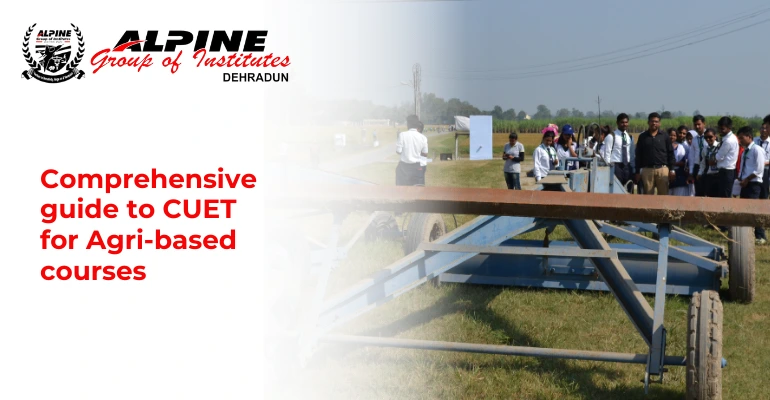A Comprehensive Guide To CUET For Agriculture-Based Courses
2024-12-16 8:10A Comprehensive Guide To CUET For Agriculture-Based Courses
The Common University Entrance Test (CUET) is a nationwide entrance exam introduced by the National Testing Agency (NTA) for students seeking admission to various undergraduate programs across central universities in India. It was designed to streamline the admissions process, replacing the traditional system where each university conducted its own entrance exam. CUET aims to provide a more standardized and fair admission process, offering opportunities for students from diverse educational backgrounds to secure spots in top-tier universities.
Key Aspects of CUET:
Unified Admission Process:
CUET unifies the admission process for multiple universities, making it easier for students to apply to a variety of institutions through a single test.
Focus on Merit:
CUET aims to reduce discrepancies in admission processes and ensure that the admissions are based on merit, rather than relying solely on school board marks.
Multiple Subjects:
CUET offers exams in a wide range of subjects, including languages, sciences, humanities, and vocational courses. It includes both domain-specific subjects and general tests.
Online Mode:
The exam is conducted in online mode, and students can take it at various centers across the country.
Eligibility:
The exam is open to students from different educational backgrounds who meet the eligibility criteria set by the universities participating in CUET.
CUET for Agriculture-Related Programs:
For students interested in agriculture and agriculture-related courses, CUET provides a gateway to a wide range of undergraduate programs offered by universities such as B.Sc. Agriculture, B.Tech in Agricultural Engineering, B.Sc. Horticulture, and other programs in agricultural sciences. The agricultural sector is vital to India’s economy, and there is a growing demand for skilled professionals in this field. CUET offers agricultural aspirants a chance to access top-tier agricultural programs across central universities.
How CUET applies to agriculture students:
1. Agricultural Science and Engineering Programs Offered via CUET:
Many central universities, including some of the top agricultural institutions in India, offer undergraduate programs in agricultural sciences through CUET.
B.Sc. Agriculture:
A comprehensive program focused on crop production, soil science, agricultural economics, and more.
B.Tech Agricultural Engineering:
A technical program that blends engineering with agriculture, preparing students for careers in agricultural machinery, irrigation systems, and agritech.
B.Sc. Horticulture:
Focuses on the cultivation of fruits, vegetables, and ornamental plants.
B.Sc. Food Science and Technology:
Covers food processing, preservation, and nutrition, essential for the growing food industry.
B.Sc. Agricultural Economics:
Focuses on the economic principles governing agricultural markets and policies.
B.Voc in Agricultural and Food Technology:
Vocational training for students who wish to specialize in agriculture or food processing technologies.
2. Eligibility Criteria
Educational Qualification:
Students must have completed their 10+2 education (Higher Secondary) with a science stream (Physics, Chemistry, and Biology/Mathematics). Some specific courses may require students to have studied Biology and/or Chemistry at the 12th level, such as for B.Sc. Agriculture or B.Sc. Forestry.
Minimum Marks:
Different universities may have different cutoffs, but generally, a student needs to have a minimum of 50% to 60% marks in their 12th-grade exams.
3. CUET Exam Pattern for Agriculture Students
CUET consists of multiple sections, but agriculture students will be most concerned with the following parts:
Section IA & IB (Language Tests):
Students are required to choose one language, either from Section IA (English) or Section IB (Hindi), or another available language depending on their preference.
Section II (Domain-Specific Subjects):
This section is critical for agriculture students. Here, students need to select the domain subjects relevant to the agriculture program they are applying for. For instance, agriculture aspirants will typically choose subjects like:
- Biology (Essential for programs like B.Sc. Agriculture, B.Sc. Forestry, etc.)
- Chemistry (Common for programs like B.Sc. Agriculture, Agricultural Engineering)
- Physics or Mathematics (If applying for a program like B.Tech. in Agricultural Engineering or related technical courses)
- The Domain-Specific Section is a major factor in admission to agriculture-related programs, so students need to carefully choose their subjects based on the course they are interested in.
- Section III (General Knowledge and Current Affairs): Some universities may include a general knowledge section to test the student’s awareness of current events and general science. It’s usually not a major part of the agricultural stream but could still contribute to the overall score.
- Section IV (Logical and Analytical Reasoning): Depending on the program, some universities may require students to attempt reasoning-based questions, though it is generally less common for agriculture-specific programs.
4. Choosing the Right Subjects for Agriculture Programs
Based on the course you are targeting
For B.Sc. Agriculture and B.Sc. Hons. Agriculture:
- Choose Biology and Chemistry as domain subjects.
- If required, include General Knowledge as a section, depending on the university.
- For B.Tech. Agricultural Engineering:
- Choose Physics and Mathematics as domain subjects (since this is more of an engineering-based program).
- For B.Sc. Forestry or Environmental Science:
- Select Biology as your domain subject.
- Some programs may also consider Chemistry as a necessary subject.
5. Preparation Tips for CUET (Agriculture Students)
Review Your 12th Grade Syllabus:
CUET domain sections are based on the 12th-grade syllabus, revising key topics from Biology, Chemistry, and Physics/Mathematics will be essential.
Practice Mock Tests:
Take advantage of mock tests to get familiar with the exam pattern and improve your time-management skills.
Focus on Core Agricultural Topics:
If your program is more agriculture-specific (like B.Sc. Agriculture), make sure to revise topics related to plant biology, soil science, agriculture techniques, and environmental science.
Stay Updated on General Knowledge:
This will be helpful for any general knowledge sections or for interview rounds in some universities.
6. Admission Process
After the CUET exam:
- CUET Results: After the exam, CUET will release the results in the form of a scorecard.
- Cutoffs and Counseling: Each participating university will release its cut-off marks based on CUET scores for different programs. If you meet the cutoff, you will be eligible for counseling or the further admission process.
The counseling process generally includes document verification, choice filling, and seat allotment.
Participating Universities for CUET
CUET (Common University Entrance Test) is conducted by the National Testing Agency (NTA), and many Central Universities and some State Universities participate in CUET for admissions to their undergraduate programs.
Central Universities Offering Agriculture Programs
- Banaras Hindu University (BHU), Varanasi
- University of Delhi (DU), New Delhi
- Jawaharlal Nehru University (JNU), New Delhi
- Aligarh Muslim University (AMU), Aligarh
- University of Allahabad, Allahabad
- Indira Gandhi National Open University (IGNOU), New Delhi
- Tezpur University, Assam
- North-Eastern Hill University (NEHU), Shillong
State Universities Offering Agriculture Programs
- Govind Ballabh Pantnagar University, Uttarakhand
- Uttar Pradesh Pandit Deen Dayal Upadhyaya Pashu Chikitsa Vigyan Vishwavidyalaya (DDUUP), Mathura
- Uttarakhand University of Horticulture and Forestry (UUHF), Bharsar
- Hemwati Nandan Bahuguna Garhwal University (HNBGU), Srinagar
- Kumaun University, Nainital
- University of Madras, Chennai
- University of Mumbai, Mumbai
- Punjab Agricultural University (PAU), Ludhiana
- Bihar Agricultural University (BAU), Sabour
- Rajasthan Agricultural University (RAU), Bikaner
- Jawaharlal Nehru Agricultural University (JNAU), Jabalpur
- Maharana Pratap University of Agriculture and Technology (MPUAT), Udaipur
- West Bengal University of Animal and Fishery Sciences (WBUAFS), Kolkata
Conclusion
The CUET provides an efficient and centralized way for students to apply to multiple universities for agriculture-related undergraduate programs. With the right preparation, you can increase your chances of securing a seat in one of these programs. Make sure to keep an eye on the official CUET website for notifications, syllabus, and other important updates regarding the entrance exam.
For agriculture students, CUET provides a streamlined way to apply to multiple universities for agriculture-related undergraduate programs. CUET simplifies the admission process for students aspiring to pursue agriculture-related programs by offering a centralized entrance exam. Many Central Universities , some State Universities and Private Universities in India now accept CUET scores, making it easier for students to apply to multiple universities with a single exam.









